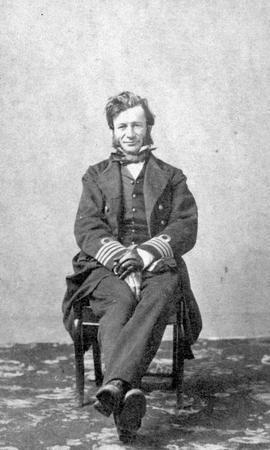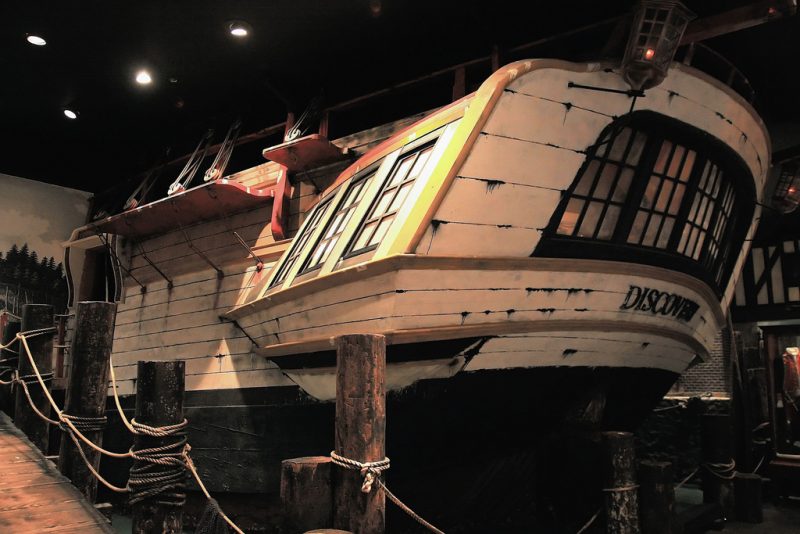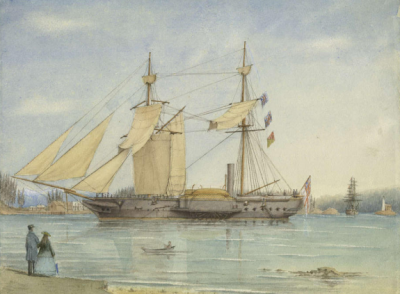Ormsby #98 Our Eden, revisited
From James Cook to George Richards, imperialist explorers get their due in a coffee table book, A Perfect Eden.
March 04th, 2017

A replica of Captain George Vancouver's cabin in HMS Discovery at Royal BC Museum.
Mapmaker Michael Layland charts a second paean of praise for Vancouver Island.
REVIEW: A Perfect Eden: Encounters by Early Explorers of Vancouver Island
by Michael Layland
Victoria: TouchWood Editions, 2016.
$39.95 / 9781771511773
Reviewed by Robin Fisher
[Michael Layland is one of two double nominees for this year’s B.C. Book Prizes. A Perfect Eden: Encounters by Early Explorers of Vancouver Island (TouchWood Editions) is in the running for the Roderick Haig-Brown Prize and the Bill Duthie Booksellers’ Choice Award. — Ed.]
*
When I returned to the coast after a decade living on the prairies I settled initially on Vancouver Island. Speaking to a friend who had already moved there from Prince George, I asked how much the ferries were a drawback to Island living. His response was that ferry travel was no problem at all because you only had to take it once!

 For those who love Vancouver Island the love affair is deep and abiding and there is nowhere else in Canada that they would rather be. It is the early history of this attachment to place that Michael Layland describes in A Perfect Eden.
For those who love Vancouver Island the love affair is deep and abiding and there is nowhere else in Canada that they would rather be. It is the early history of this attachment to place that Michael Layland describes in A Perfect Eden.
The book provides an account of the exploration of Vancouver Island by newcomers from the late eighteenth to the middle of the nineteenth century.
It constitutes a second verse in Michael Layland’s paean of praise for Vancouver Island. The first was The Land of Heart’s Delight, an account of the early maps and charts of Vancouver Island.
While they are companion pieces with some overlap between them, the author’s intent is that each will stand alone (p. xv). The first describes the lay of the land and the second the reaction that newcomers had to it.
Much of the exploration of Vancouver Island was carried out by agents of imperialism that had geographic, strategic, scientific, and particularly commercial interests in the area. The Spanish had some involvement in the early going at the end of the eighteenth century, but the exploration described here really begins and ends with the Royal Navy: beginning with James Cook and George Vancouver and ending the with the voyages of George Richards on the Hecate that concluded in 1862.
Cook was the first European to land on Vancouver Island and Vancouver, along with Bodega y Quadra, established that it was an Island. Richards conducted detailed surveys of much of the Island coastline so that by the 1860s Vancouver Island was thoroughly surveyed and mapped.
The Hudson’s Bay Company was another imperial party that had a keen interest in having a clear understanding of the geography of Vancouver Island. Indeed the title of the book comes from a comment made by James Douglas when he came looking for a headquarters for the company on the coast north of the forty-ninth parallel that would be more secure against American expansion.
Douglas thought that the area around what is now Victoria “appears a perfect ‘Eden’.”
Now, it should be noted that Douglas did go on to say that he came to that conclusion about southern Vancouver Island “in the midst of the dreary wilderness of the North West coast, and so different is its general aspect, from the wooded, rugged regions around, that one might be pardoned for supposing it had dropped from the clouds into its present position” (p. 99).
We so often find one place attractive in comparison with another, especially when visiting for the first time, and this was certainly true of early European visitors to the coast. Unlike the rugged coastline to the north, southern Vancouver Island felt more like the places that they had come from in England or Europe.
Indeed, George Vancouver thought that his presence on one part of the coast was so forlorn that he named it Desolation Sound. We now think of it as one of the most beautiful parts of this coast that is now our home.
Surveys around the coast of Vancouver Island were, towards the end of the period covered in this book, supplemented by European exploration of land routes across the Island. In a sense Douglas began this process by carrying out the first serious land exploration as he looked for place for a fort and, of course, the Hudson’s Bay Company needed to know about what resources the Island offered as its operations diversified from the sole focus on fur trading.
Traverses across the Island tended to follow trading routes that the First Nations people had followed for centuries, and that is a reminder that most of the exploration of the northwest coast would have been a lot more difficult if it were not for the support of its first inhabitants.
And all this exploration, which is presented here as a European achievement, was a part of the overall impact of European presence that first enhanced and then diminished First Nations cultures.
In A Perfect Eden, Michael Layland describes the origins of our love affair with Vancouver Island. For much of it he lets those who came here speak for themselves with liberal quotes from their writings. He does not offer a lot of analysis, but rather tells the story of European exploration of, and growing attachment to, this particular part of the world.
His own training as a mapmaker is apparent, for example, in the detail with which he describes the Royal Navy vessels. He tells the story with knowledge and affection and the book is beautifully produced and illustrated.
Though, as it turned out, I have taken the ferry back to the mainland many times since I moved to Vancouver Island, every time I do I ask myself, “is there a better place to be in Canada than Douglas’s perfect Eden.”
Michael Layland certainly knows the answer to that question and reading his book confirms that I would not want to argue with him.
*
Robin Fisher returned to the coast after holding administrative positions and teaching in Universities further west. Earlier in his career as an historian at Simon Fraser University he published on the history of British Columbia, the Pacific, and New Zealand. His books include Contact and Conflict (UBC Press, 1977) and Duff Pattullo of British Columbia (University of Toronto Press, 1991) There must be something about the name Duff as he is now working on a biography of the anthropologist, Wilson Duff.
*
The Ormsby Review. More Readers. More Reviews. More Often.
Reviews Editor: Richard Mackie
Reviews Publisher: Alan Twigg
The Ormsby Review is hosted by Simon Fraser University. The Advisory Board consists of Jean Barman, Cole Harris, Wade Davis, Hugh Johnston, Patricia Roy, David Stouck, and Graeme Wynn.
—
BC BookWorld
ABCBookWorld
BCBookLook
BC BookAwards
The Literary Map of B.C.
The Ormsby Review







Leave a Reply